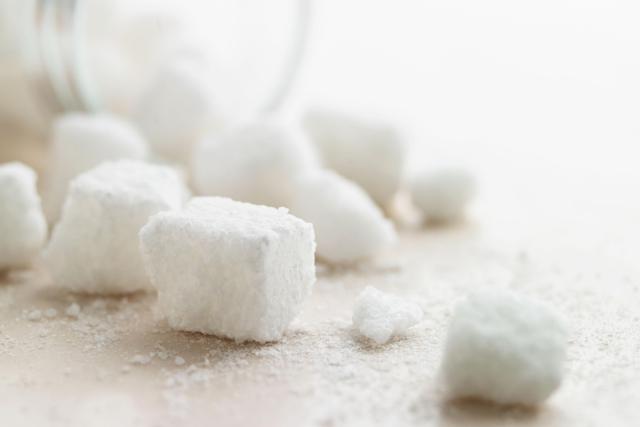A few years ago, a family member was diagnosed with breast cancer and it got me thinking about an article that I had read a few years prior which stated that by lowering our use of sugar in the diet, we can also lower our chances of developing cancer. I have done some research to try to find this particular article but haven’t had any success. But I believe this to be true due to various other research findings that I have read to support it.
Here is what I have found:
- When you eat or drink something high in sugar, there is a quick rise of sugar in your blood. The body responds to elevated blood sugar (also known as blood glucose) by producing insulin to regulate the glucose in the blood. When you eat a diet high in sugar, there is a higher level of insulin present in the bloodstream. This is a problem because high levels of insulin encourage the liver to produce a insulin-like growth factor, IGF-1. IGF-1 promotes growth in fetuses and in childhood. However, in older adults, IGF-1 promotes aging and causes inflammation. In 1998, medical researchers at Harvard University found that high levels of IGF-1 in the blood contributed to the growth of tumors and significantly increased the risk of developing colorectal, premenopausal breast, and prostate cancers.
- NOTE: Eating a diet high in animal protein, also increases the production of IGF-1.
Click here to read more.
- A diet high in sugar and highly-digestible carbohydrates such as white bread and white rice (which also rapidly elevates blood glucose), may lead to insulin resistance and type 2 diabetes as well as obesity which all increase the risk of developing cancer.
According to the infamous Dr. Otto Warburg, cancer cells metabolize through fermentation (which requires sugar), whereas normal healthy cells require oxygen. It is because of Warburg’s findings, for which he was awarded the Nobel Prize, that we see a link between sugar and cancer. It is also why food therapies for cancer patients attempt to eliminate sugar and easily digestible carbohydrates (that are converted to simple sugars by the body) from the diet.
- Both natural and highly processed sugars cause a spike in blood glucose and the release of insulin into the bloodstream, as they are digested and converted into fuel or fat. However natural sweeteners are better because they gow through no or very limited processing before they hit the shelves. Some natural sweeteners are also good sources of fibre and minerals. For instance blackstrap molasses is a good source of iron. Read more about the different types of natural sweeteners here.
There is a history of breast cancer in my family. And it is scary because it means my daughter will have to be cautious and lead a healthy lifestyle to reduce the risks. I know she is off to a good start because I provide both my children a mostly all organic diet and limit highly processed foods. I also limit the use of white sugar (which is highly refined) in my children’s diet. I instead opt for more natural sources such as honey, brown sugar, maple syrup, and even agave nectar, in moderation of course. Exercise is as important as a healthy diet and I make sure my children get plenty of exercise. I hope by steering my children in the right direction that they will continue to lead a healthy lifestyle through adulthood.
Here are Some Tips for Healthy Living:
- Opt for whole grains (whole-wheat bread, brown rice, rolled oats, quinoa, buckwheat, etc.)
- Eat a high-fibre diet.
- Choose whole fruits and non-starchy vegetables.
- Avoid fast food, prepackaged foods, and frozen dinners.
- Avoid pop and other sugary drinks.
- Consider buying organic. Click here to read Why Choose Organic?
- Limit refined white sugar and artificial sweeteners and choose natural sweetners in moderation (honey, molasses, agave nectar, etc.)
- Beware of hidden sugars in foods such as cereals, pasta sauces, condiments, salad dressings, dips, and even yogurt. Read food labels carefully! Click here to read How to Choose a Healthy Cereal.
- Gradually reduce the amount of sugar you add to your tea or coffee and the amount of sweets you eat. The less sugar you eat, the less your body will crave it.
- Eat less meat (animal protein); instead choose plant-based proteins such as legumes, beans, nuts, and seeds.
- Stay hydrated.
- Make exercise part of your daily routine.
CONCLUSION:
Unfortunately cancer is all too common these days; we all know of or have heard of someone who has or has had cancer. The American Cancer Society predicts that 1 in 3 cancers are due to obesity, lack of exercise, and poor nutrition. If by making lifestyle changes, we can reduce the risk of developing cancer or even prevent cancer, we should definitely think twice about what we feed our bodies. Afterall, a healthy diet can potentially save your life!
Feature Image: breastcancer.about.com






[…] people consume a lot more than the recommended daily maximum intake of sugar. Over-consumption of refined sugars has been linked to obesity, diabetes, and certain types of cancer. To cut down on your daily sugar intake, you can start by slowly reducing the amount of sugar in […]